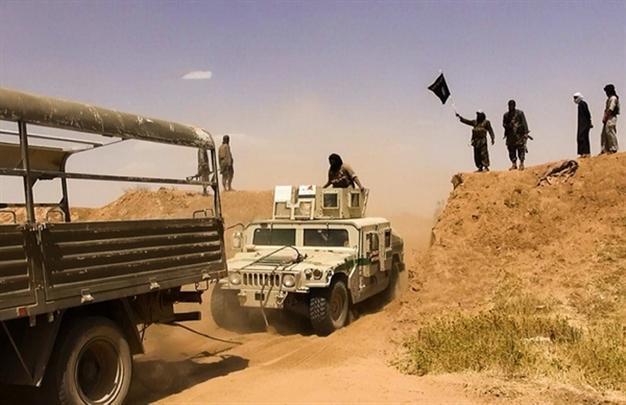ISIL Iraq onslaught aids Syria regime, rebels: analysts
BEIRUT - AFP

An image made available by the jihadist Twitter account Al-Baraka news on June 9, 2014 allegedly shows ISIL militants waving the trademark jihadist flag as vehicles drive on a newly cut road through the Syrian-Iraqi border between the Iraqi Nineveh province and the Syrian town of Al-Hasakah. AFP PHOTO / HO / ALBARAKA NEWS
Both Syrian President Bashar al-Assad and jihadist groups battling to oust him stand to benefit from a lightning offensive by militants across the border in Iraq, analysts believe.Fighters from the powerful jihadist Islamic State of Iraq and the Levant (ISIL) group began an offensive in Iraq on Monday, taking a swathe of mostly Sunni Arab territory in the north.
The attack led by ISIL, which operates in both countries, has brought the Iraqi army to the brink of collapse.
Analysts say their advance could deliver not just a military boost to jihadists in Syria, but also political gains for Assad.
ISIL’s brutal tactics and reputation for abuses against civilians and rival rebels may force Western governments to reconsider their support for Syrian insurgents.
"Washington and London are going to find themselves on the same side as Damascus, facing what appears to be a threat to the region, the West and Europe," said Frederic Pichon, author of "Syria: Why the West was Wrong".
Since the beginning of the Syrian conflict in March 2011, Assad has become the "bete noire" of the Western governments who opposed him.
With more than 162,000 people killed in the more than three-year-long conflict and fighting still raging, Assad won a third, seven-year term in office earlier this month in an election dubbed a "parody of democracy" by opponents.
But for Bassam Abu Abdullah of the Damascus Centre for Strategic Studies, which is close to the regime, ISIL’s advances could alter Western policy.
He said the change may come "because there is an imminent threat to the security and stability of the whole region".
Events in Iraq have bolstered the Syrian government’s claims that the threat posed by "terrorists" in the region requires a regional and international response, he said.
"Particularly when you consider that there are Europeans and Americans among the jihadists’ ranks," he said.
The Damascus government labels all rebels as "terrorists" and has repeatedly accused the West, Turkey and Gulf Arab states of backing insurgents financially and militarily.
But the jihadist push on Baghdad could also increase the pressure on Assad’s troops, other analysts said.
Firas Abi Ali, of London-based risk analysts IHS, said the Iraqi army’s withdrawal from the border is a major "problem for the Syrian government because they need that border to be open to get supplies from Iraq".
If not enough volunteers can be found to tackle the militant advance in Iraq, it is possible that Iraqi Shiite militiamen fighting alongside Assad’s troops could be recalled.
This, Abi Ali says, could dent the Syrian government’s battlefield strength.
For ISIL, which is currently fighting other rebels in Syria, including their fellow jihadists in the Al-Qaeda-linked Al-Nusra front, their advances in Iraq are a huge military and financial step forward.
"The seizure of Mosul is going to increase ISIL’s prestige around the world, but especially in Syria," said Romain Caillet, an expert in radical Islamism in the region.
ISIL’s successes in Fallujah, Ramadi and Mosul could persuade people that "it could also take cities in Syria, which the revolution, for all its outside support, is unable to do," he added.
The jihadist group and its tribal allies brought Iraq’s armed forces close to collapse with their offensive, with many troops shedding their uniforms and abandoning positions and equipment.
"It may not necessarily be a game changer altogether for Syria, but ISIS will come out of all of this significantly strengthened and emboldened with confidence," said Charles Lister of the Brookings Doha Centre.
ISIL "has already transferred captured weaponry and new recruits into parts of northern and eastern Syria, and it seems likely this will serve to bolster their counter offensives in Deir Ezzor and farther west towards Aleppo," he added.
The Syrian Observatory for Human rights, a Britain-based monitoring group, also said weapons seized in Iraq are being taken into Syria.
Some in Syria’s armed opposition welcomed ISIL to the battle when it first emerged there in 2013.
But its abuses prompted a backlash that escalated into open hostilities between ISIL and a coalition of moderate and Islamist rebels backed by Al-Nusra Front.
The inter-rebel fighting inside Syria is estimated to have killed 6,000 people since January.
















